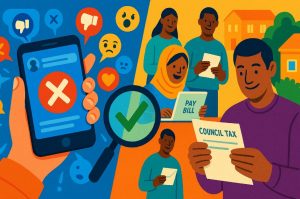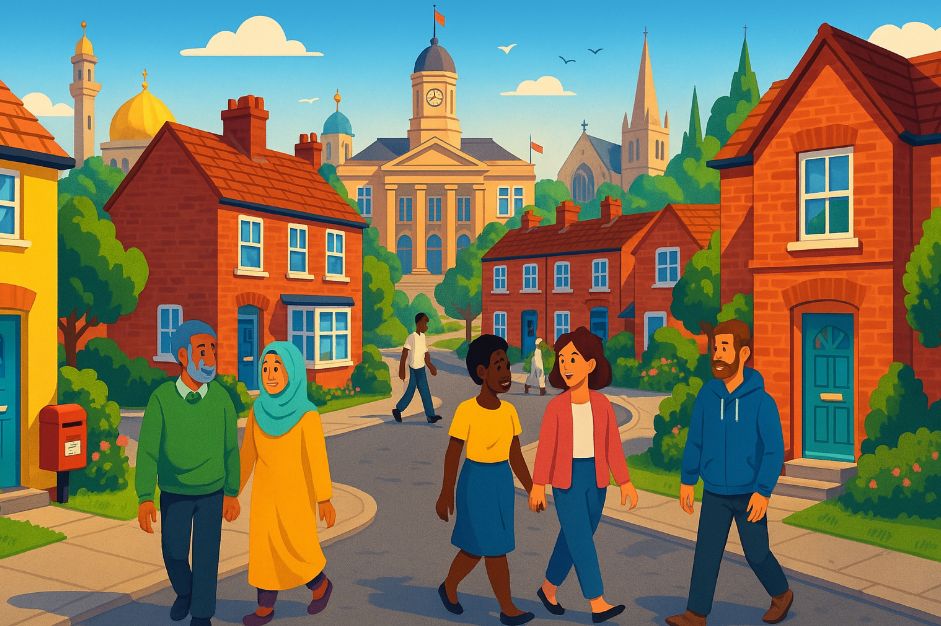Council tax is a standard charge for residents in the UK, but online misinformation has created confusion—especially around whether Muslims are treated differently. Claims that some faith groups receive special exemptions have been widely shared, prompting real concern about fairness, legality, and equality.
So, let’s get to the heart of it: Do Muslims pay council tax in the UK? And are any religious groups treated differently?
This article breaks it all down with real-time facts, verified government guidance, and independent analysis to help you cut through the noise.
Why Do UK Residents Pay Council Tax in the UK?

Council tax is charged by local authorities to help fund vital public services. This includes:
- Waste collection
- Emergency services
- Local schools and education
- Street lighting and road maintenance
- Social care and libraries
It’s a property-based tax, meaning what you pay is largely determined by your home’s valuation band (set according to 1991 market values in England and Scotland). There are reductions available for certain categories of people, but they’re based on need and circumstance, not religion.
Who Typically Pays Council Tax in the UK?
Anyone over 18 who owns or rents a home in the UK usually pays council tax. There are a few groups that may qualify for reductions or full exemptions, such as:
- Full-time students
- People living alone
- Individuals with severe mental impairment
- Caregivers
- Low income households
Again, none of these conditions are linked to religious affiliation.
Are Muslims Treated Differently Under UK Council Tax Rules?
This rumour started with a viral online petition, falsely claiming Muslims who use parts of their homes for prayer are exempt from paying council tax. It went further to suggest that other religions are not given the same courtesy.
Independent fact-checking group FullFact.org investigated this claim and confirmed it’s completely false. No special treatment exists for Muslims or any religious group under current UK tax law.
The Origin of the Claim
The petition stated:
“Muslims who use their living area’s within their homes as a place of Worship, are exempt from paying Council Tax. This however does not apply to other religions.”
This wording was later flagged by FullFact as misleading, and no supporting legislation or evidence could be found to back the claim. The UK tax system is based on secular laws, applied equally to all.
Is Religion Ever a Factor in Council Tax Exemptions in the UK?

No, religious belief or practice has no bearing on whether someone is liable to pay council tax.
So What Does Qualify for Exemption?
Only certain statuses or property conditions qualify for exemption or discount, such as:
- Unoccupied properties
- Homes exclusively occupied by students
- People with severe mental impairment
- Care homes or hostels
- Full-time students in halls of residence
These exemptions are available to all, regardless of faith.
Why Are Some Mosques or Churches Exempt from Tax in the UK?
This is a common source of confusion. Some religious institutions are exempt from business rates, but that is not the same as council tax on residential properties.
Business Rates vs Council Tax
- Council tax applies to residential properties.
- Business rates apply to commercial or non-residential properties.
If a church or mosque operates exclusively as a place of public worship, it may be exempt from business rates. This exemption is based on usage, not religion. It applies equally to synagogues, temples, churches, gurdwaras, and mosques.
But if the building also includes a residential section such as living quarters for a caretaker that portion is still liable for council tax.
Can Someone Avoid Council Tax by Creating a Prayer Room at Home?
Absolutely not.
This is the core of the misinformation. Some believe that by turning part of a home into a prayer space, they can avoid paying council tax. That’s simply not true.
Home Usage Still Matters?
Unless the entire property is reclassified and legally registered as a place of worship (a very rare occurrence for private homes), it remains a residence in the eyes of the law. Prayer activities, no matter how frequent or devout, do not change the property’s official use.
Local councils follow strict guidelines for exemptions, and home-based religious practice does not qualify.
What Does Islam Say About Paying Taxes Like Council Tax in the UK?

From a religious perspective, Islam encourages fairness, justice, and contributing to the society one lives in.
Zakat vs Council Tax
- Zakat is one of the Five Pillars of Islam, a charitable donation for the welfare of the poor and needy.
- Council tax, on the other hand, is a civic duty and a legal requirement for everyone in the UK.
Islamic scholars around the world have agreed that Muslims living in non-Muslim majority countries must respect local laws, including tax obligations. Paying council tax doesn’t contradict Islamic values it supports public welfare and civil order.
Do Muslims Ever Receive Council Tax Support in the UK?
Yes, but only under the same conditions as anyone else.
The Council Tax Reduction (CTR) Scheme
Muslims may apply for council tax reduction if they:
- Receive Universal Credit, income support, or jobseeker’s allowance
- Are on a low income
- Live alone
- Are students (especially full-time)
- Have dependents or disabilities
Again, these are universal benefits with no ties to religious identity.
How Does the UK Government Ensure Equal Treatment in Council Tax?
The UK’s legal and financial systems are based on equality under the law. Local authorities assess council tax eligibility using official guidelines and do not factor in race, religion, or nationality.
Checks and Balances
Councils perform audits and investigations into any exemption claims. If someone falsely claims a discount or exemption religious or otherwise they could face:
- Repayment demands
- Fines
- Legal prosecution for fraud
This ensures that everyone is treated fairly under the same set of rules.
Who Actually Pays Council Tax in the UK? A Real-World Snapshot
| Group / Status | Pays Council Tax? | Basis for Exemption or Support |
| Muslim Residents | Yes | Same rules apply as for other UK residents |
| All UK Citizens | Yes | Income level, status, and household type |
| Churches / Mosques / Temples | Depends | Exempt only if used solely for worship |
| Students | Often No | Must be full-time and meet formal criteria |
| People with Severe Mental Impairment | No | Requires GP confirmation and qualifying benefits |
| Low-Income Households | Maybe | May receive Council Tax Reduction |
Why Is There a Myth About Muslims and Council Tax in the UK?

The myth likely began from confusion between council tax and business rate exemptions for places of worship. Some religious buildings, like mosques or churches, may be exempt from business rates if used solely for public worship but this doesn’t apply to homes.
A now-debunked online petition falsely claimed that Muslims using a room at home for prayer were exempt from council tax. This claim was investigated and proven untrue by FullFact.org.
The UK tax system doesn’t grant religious exemptions for council tax. All residents are treated equally under the law, regardless of faith.
Conclusion
Muslims in the UK are not exempt from paying council tax. This myth, spread by online misinformation, has been debunked by FullFact.org and contradicts UK law.
Council tax is based on property use and personal circumstances, not religion. Exemptions apply equally to all, regardless of faith.
In short, everyone follows the same rules, and the UK tax system treats all residents fairly and equally.
FAQs About Muslims Pay Council Tax in the UK
Are Muslims the only group exempt from council tax in certain situations?
No group is exempt based on religion. Muslims, like anyone else, must meet standard legal criteria for discounts or exemptions.
Can a private home become a mosque and avoid tax?
A residential property used as a home remains taxable, even if used for prayer. It must be reclassified and registered officially to be exempt from certain taxes.
Do churches pay tax in the UK?
Churches and other places of worship may be exempt from business rates, not council tax. If part of the property is residential, that part still pays council tax.
Is council tax un-Islamic?
Not at all. Islam encourages civic responsibility. Taxes like council tax are part of contributing to public welfare.
What help is available for Muslims struggling with council tax payments?
Muslims can apply for the Council Tax Reduction scheme if they meet the same income and benefit criteria as anyone else in the UK.
Has the UK government ever granted religious exemptions for council tax?
No. Council tax policy is secular and applies equally. Any exemptions are based on law—not faith.
Where can I learn more or report misinformation?
Check official resources like gov.uk and independent fact-checkers like fullfact.org for the latest, accurate information.









Leave feedback about this